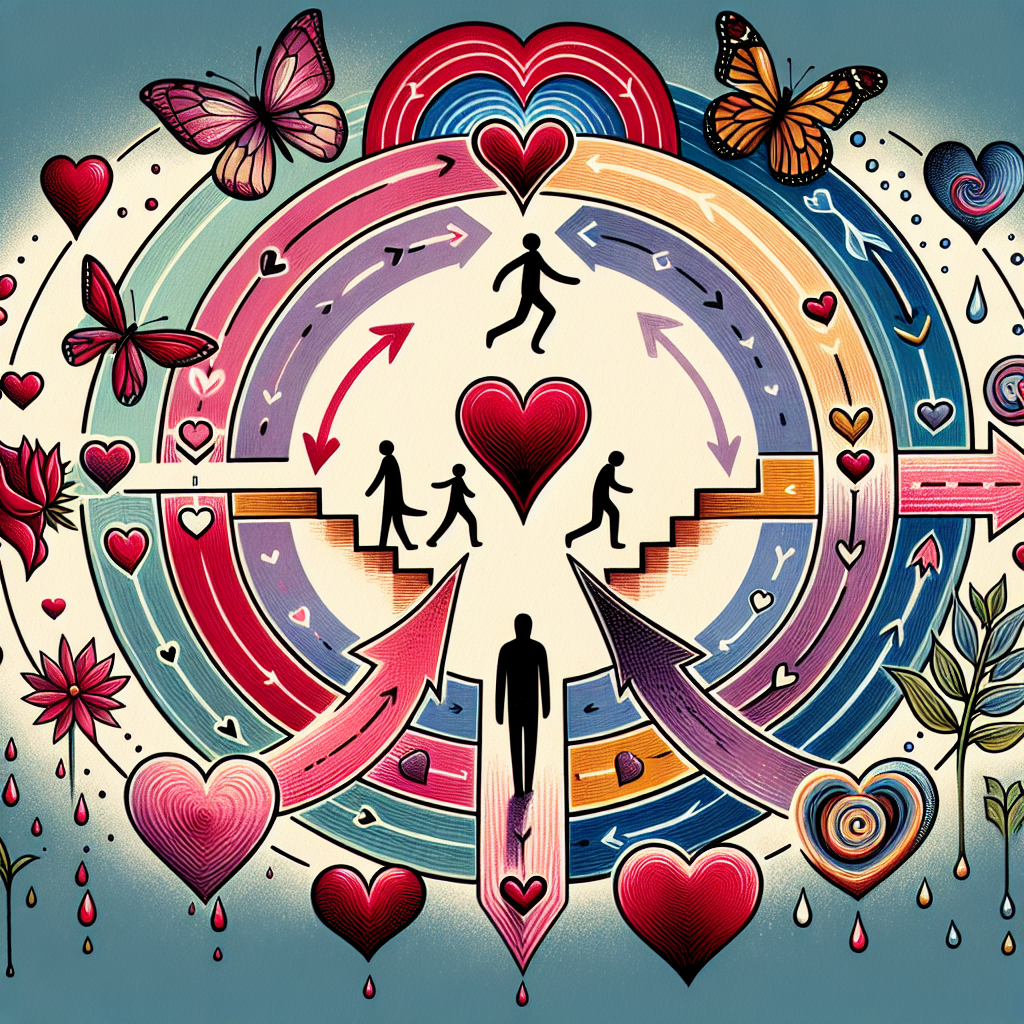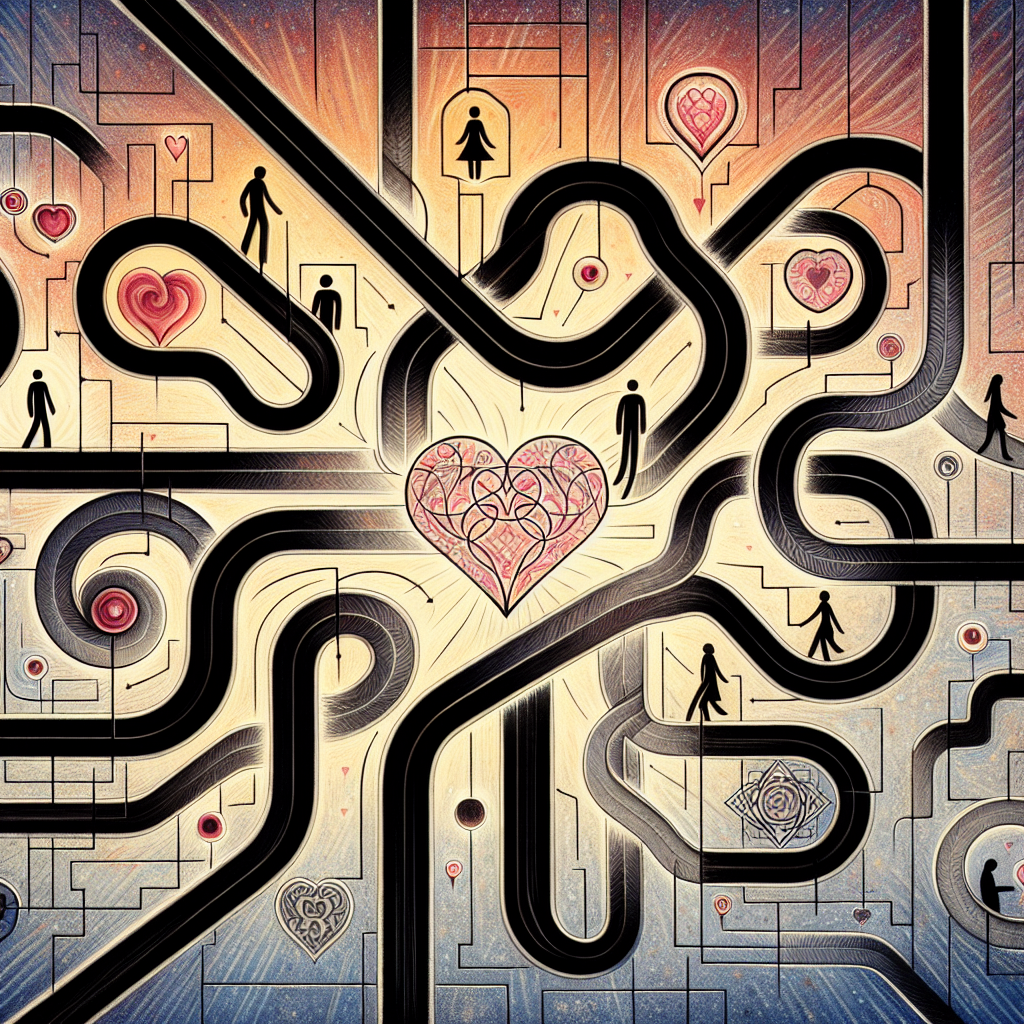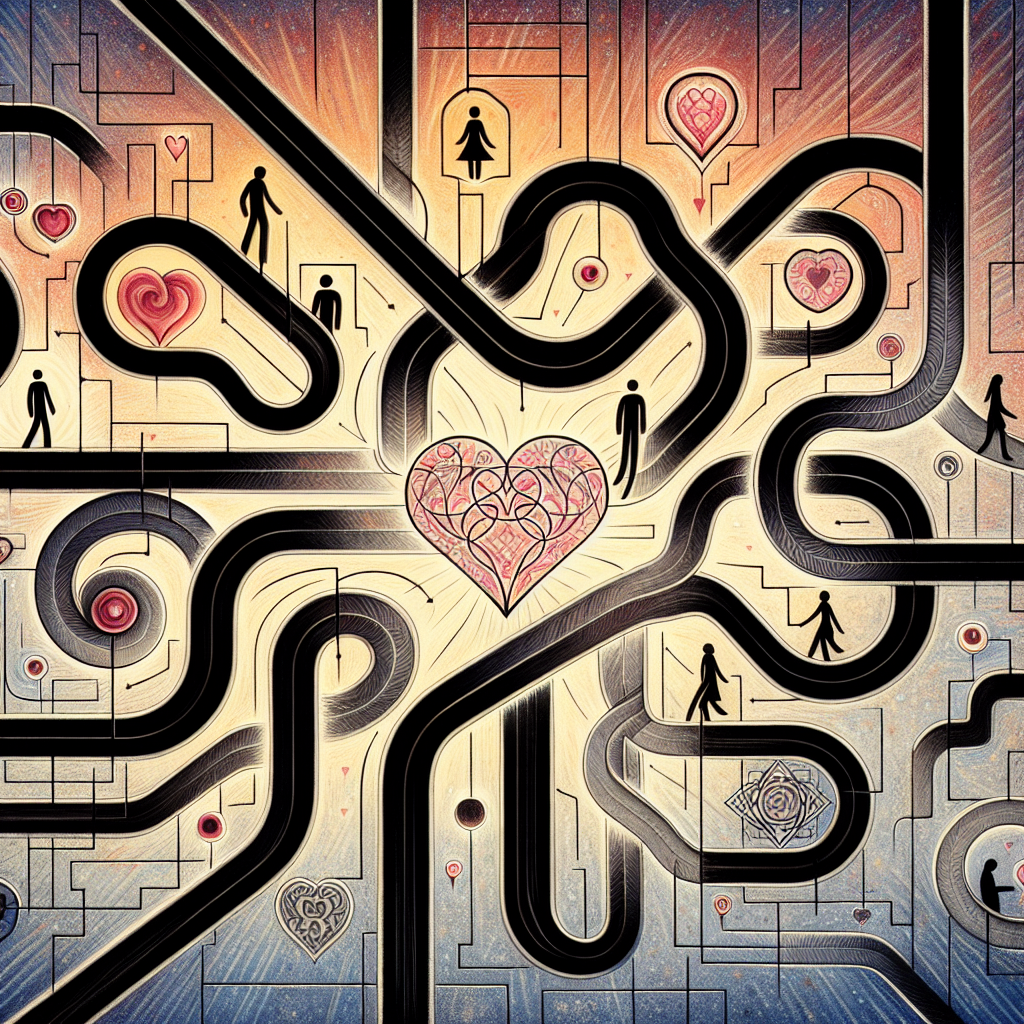In life, there are countless moments of love that we experience. From the tender embrace of a parent to the fiery passion of a romantic relationship, love comes in many different forms. But have you ever wondered how many times you will truly fall in love? Will it be just once, a whirlwind that leaves an indelible mark on your heart? Or will it be multiple times, each love a unique chapter in the story of your life? Join us as we explore the depths of this question and uncover the mysteries of love’s infinite possibilities.

The Illusion of Falling in Love
Have you ever experienced love at first sight? That magical, almost surreal moment when you see someone for the first time and feel an instant connection? This phenomenon, while often romanticized, may be more of an illusion than we realize. Love at first sight is often based on superficial qualities such as physical appearance, which can give rise to infatuation rather than true love. In order to truly understand the nature of falling in love, it is important to differentiate between infatuation and genuine love.
Love at First Sight
Love at first sight is often portrayed as an instantaneous and intense connection that occurs upon first meeting someone. It is the stuff of fairy tales and Hollywood romances. But is it real? While it is possible to feel a strong attraction to someone upon first meeting them, it is important to recognize that this initial spark is often based on external factors rather than a deep emotional connection. True love takes time to develop and requires a deeper understanding and acceptance of the other person.
Infatuation vs True Love
Infatuation, often mistaken for love, is characterized by an intense desire and obsession for another person. It is fueled by idealized perceptions and a rush of emotions. However, infatuation is fleeting and may fade once the initial excitement wears off. True love, on the other hand, is built on a foundation of trust, respect, and genuine affection. It takes time to cultivate and grows stronger through shared experiences, challenges, and growth as individuals and as a couple.
Understanding the Science of Falling in Love
The experience of falling in love is not just a matter of emotions, but also has a scientific basis. When you first meet someone, your brain releases chemicals such as dopamine, adrenaline, and oxytocin, which create a sense of excitement, happiness, and attraction. These chemicals are responsible for the fluttery feeling in your stomach and the obsession-like thoughts about the person you are falling for. Understanding the science behind falling in love can help you navigate the rollercoaster of emotions and make more informed decisions about your relationships.
Factors Influencing Love
Love is a complex and multifaceted emotion, influenced by various factors both internal and external. Understanding these factors can shed light on why we feel attracted to certain individuals and form lasting connections with them.
Individual Differences
Each person has unique preferences, values, and personality traits that influence the type of person they are drawn to. These individual differences can be shaped by genetics, upbringing, and personal experiences. For example, some individuals may be attracted to extroverted and outgoing partners, while others may prefer introverted and calm individuals. Recognizing and embracing your own individual differences can help you form more authentic and fulfilling relationships.
Life Experiences
Our past experiences, both positive and negative, play a significant role in shaping our views and expectations of love. For instance, if you have been hurt in the past, you may be more cautious and guarded when it comes to opening up to a new partner. On the other hand, positive experiences can create a sense of optimism and trust in love. Being aware of how your past experiences impact your approach to love can help you navigate potential challenges and foster healthier relationships.
Cultural Influences
Cultural norms and societal expectations also factor into how we perceive and approach love. For instance, some cultures prioritize arranged marriages, while others emphasize individual choice and romantic love. Understanding and appreciating the cultural influences on love can broaden your perspective and enable you to navigate relationships across different cultural backgrounds.
The Importance of Self-Love
Before you can truly love another person, it is crucial to love and accept yourself. Building a strong foundation of self-love is essential for cultivating healthy and fulfilling relationships.
Building a Strong Foundation
Self-love involves recognizing and valuing your own worth and prioritizing your well-being. It requires self-compassion, self-acceptance, and a commitment to personal growth. By taking care of yourself and building a strong foundation of self-love, you will be better equipped to give and receive love in a healthy and balanced way.
The Power of Emotional Health
Emotional health plays a pivotal role in both self-love and the ability to form meaningful connections with others. Taking care of your emotional well-being through practices such as therapy, mindfulness, and self-reflection can enhance your self-awareness, emotional intelligence, and overall satisfaction in relationships.
Learning from Past Relationships
Past relationships, whether successful or not, can provide valuable lessons and insights into what you need and want in a partner. Reflecting on your past experiences can help you identify patterns, areas for growth, and red flags to be aware of. By learning from your past relationships, you can make more informed choices and create healthier dynamics in future connections.
Falling in Love Multiple Times
Contrary to popular belief, falling in love is not limited to a one-time experience. Love is not a finite resource; it is abundant and can be felt multiple times throughout your life.
Reinventing Love
Each new relationship offers the opportunity to reinvent love and discover different aspects of yourself and your partner. It is important to approach each new connection with an open mind and heart, allowing yourself to be vulnerable and receptive to the unique experiences and growth that love can bring.
Connection and Compatibility
While love encompasses a broad range of emotions and experiences, a strong connection and compatibility are essential for long-lasting and fulfilling relationships. It involves shared values, interests, and goals, as well as effective communication and mutual understanding. Recognizing the importance of both connection and compatibility can help you make healthier choices when it comes to forming and sustaining meaningful relationships.
Love Ebbing and Flowing
Love is not a static state; it is fluid and ever-evolving. It has its highs and lows, and relationships require effort and commitment to navigate through the inevitable challenges and changes. Understanding that love can ebb and flow can help you approach your relationships with patience, understanding, and a willingness to adapt and grow together.

Love vs Lust
Love and lust are often intertwined and can be difficult to differentiate, especially in the early stages of a relationship. However, understanding the distinctions between the two is essential for building a lasting and fulfilling connection.
Distinguishing Between the Two
While lust is primarily driven by physical attraction and desire, love encompasses a deeper emotional connection and genuine affection. Lust is often short-lived and focused on the gratification of immediate desires, whereas love is built on mutual respect, trust, and long-term emotional intimacy.
The Role of Physical Attraction
Physical attraction is undoubtedly a significant factor in the initial stages of a relationship. However, it is important to recognize that physical appearance alone does not guarantee lasting love. True emotional intimacy and connection go beyond physicality and are rooted in compatibility, shared values, and a deep understanding of each other.
Emotional Intimacy
Emotional intimacy is a key differentiator between love and lust. It involves a deep sense of trust, vulnerability, and emotional support. Love requires building a strong emotional connection that goes beyond surface-level attraction and lustful desires. Emotional intimacy is nurtured through open and honest communication, active listening, and a genuine desire to understand and support your partner.
The Role of Timing
Timing plays a significant role in love and relationships. Meeting the right person at the wrong time can be a source of frustration and heartache, while being open and receptive to love can lead to beautiful connections.
Meeting the Right Person at the Wrong Time
Life is full of unexpected twists and turns, and sometimes, you may meet someone who seems perfect for you, but the timing is not right. Whether due to personal circumstances, career aspirations, or other commitments, it is important to recognize that sometimes love needs to take a backseat. However, if the connection is strong and authentic, love can withstand the test of time and be rekindled when the timing is right.
Enjoying the Present Moment
While timing is important, it is equally crucial to embrace and enjoy the present moment. Don’t let the fear of potential future challenges or the desire for perfect timing prevent you from experiencing the joy and beauty of love in the present. Be present, cherish the moments, and trust that everything will unfold as it should.
Moving on at the Right Time
Just as meeting the right person at the wrong time can be a challenge, holding on to a relationship past its expiration date can also hinder personal growth and happiness. Recognizing when it is time to let go, and having the courage to move forward, is essential for your well-being and the possibility of finding love again in the future.

Stages of Love
Love is a journey that unfolds in various stages, each offering unique experiences and challenges. Understanding these stages can help you navigate the complexities of love with greater insight and awareness.
The Romantic Attraction Stage
The initial stage of falling in love is often characterized by intense romantic attraction, infatuation, and excitement. The butterflies in your stomach, the constant thoughts of the other person, and the desire to be close to them are all signs of this early stage. However, it is important to recognize that this stage is temporary and serves as the foundation for deeper emotional connection.
The Attachment Stage
As the relationship progresses, the attachment stage comes into play. This stage is marked by a sense of security and commitment, as you and your partner navigate challenges, establish trust, and develop a deeper emotional bond. This stage requires effective communication, compromise, and a willingness to work through conflicts together.
The Companionate Stage
The companionate stage is characterized by a deep sense of familiarity, comfort, and shared life experiences. This stage is often seen in long-term relationships and is built on a strong foundation of trust, respect, and acceptance. While the initial intensity of romantic attraction may fade, the companionate stage offers the opportunity for a mature and enduring love based on mutual support and shared goals.
Love and Compatibility
Compatibility plays a vital role in the success and longevity of a relationship. Finding the right match involves aligning values, goals, and interests, as well as effectively communicating and navigating challenges together.
Finding the Right Match
Finding a compatible partner involves more than just chemistry and attraction. It requires an understanding of each other’s values, goals, and long-term aspirations. Recognizing and appreciating the importance of compatibility can lead to healthier relationships and long-term satisfaction.
Overcoming Relationship Challenges
No relationship is without its challenges. It is important to approach these difficulties as opportunities for growth and understanding. Effective communication, compromise, and empathy are essential in navigating relationship challenges and fostering a stronger bond.
Growing Together
A successful and fulfilling relationship is one where both partners are committed to personal growth and supporting each other’s individual journeys. Growing together involves celebrating each other’s successes, encouraging personal development, and being open to change and adaptation as a couple.

Unrequited Love
Unrequited love, or loving someone who does not feel the same way, can be a painful and challenging experience. However, it can also offer valuable lessons and opportunities for personal growth.
Dealing with Unreciprocated Feelings
Unrequited love can be emotionally devastating, but it is important to remember that your worth does not diminish because someone doesn’t love you back. It is essential to practice self-compassion, seek support from loved ones, and focus on healing and self-care. Understanding that unreciprocated feelings are not a reflection of your value as a person can help in the process of moving forward.
Learning from Unrequited Love
Unrequited love can teach you valuable lessons about yourself, your desires, and your boundaries. It can help you identify patterns, examine your own expectations, and gain clarity on what you truly want in a relationship. Embracing these lessons can empower you to make healthier choices in future connections.
Moving Forward and Healing
Healing from unrequited love takes time and self-reflection. It involves letting go of attachments, forgiving yourself and the other person, and redirecting your energy towards self-improvement and personal growth. Surrounding yourself with supportive friends, engaging in activities that bring you joy, and practicing self-care are essential steps in the healing process.
Conclusion
Falling in love is a beautiful and complex experience that encompasses a range of emotions, stages, and challenges. Understanding the illusions of falling in love, the importance of self-love, and the role of timing can help you navigate relationships with greater insight and awareness. By recognizing the factors influencing love, distinguishing between love and lust, and embracing the stages of love, you can cultivate meaningful connections and build a foundation for lasting, fulfilling relationships. Remember that love is not limited to just one person or one moment; it is an ever-evolving journey that offers endless opportunities for growth, connection, and happiness.


